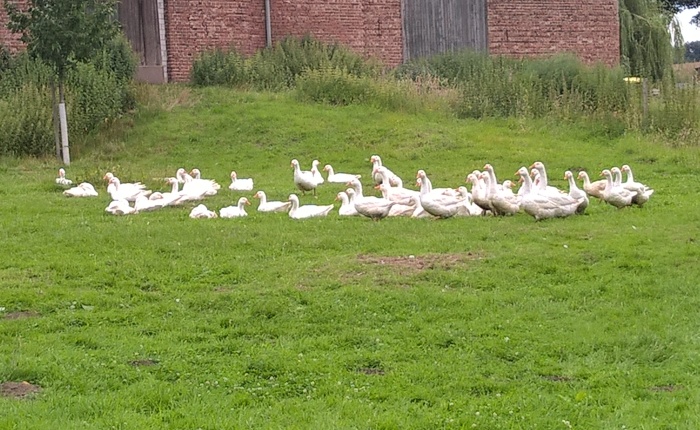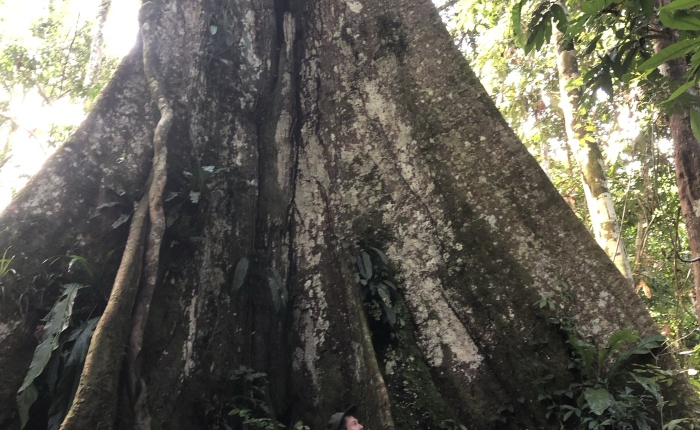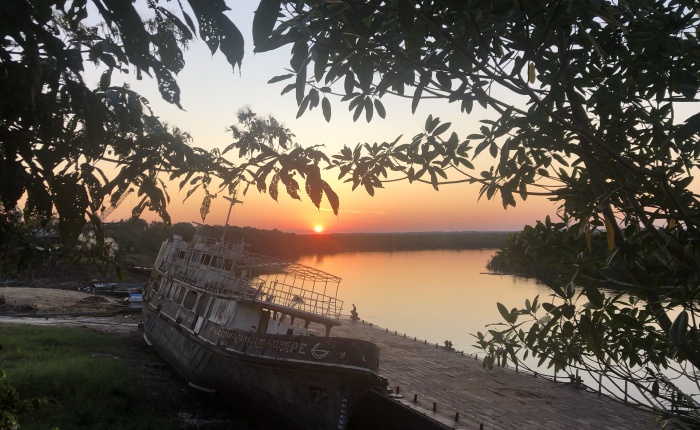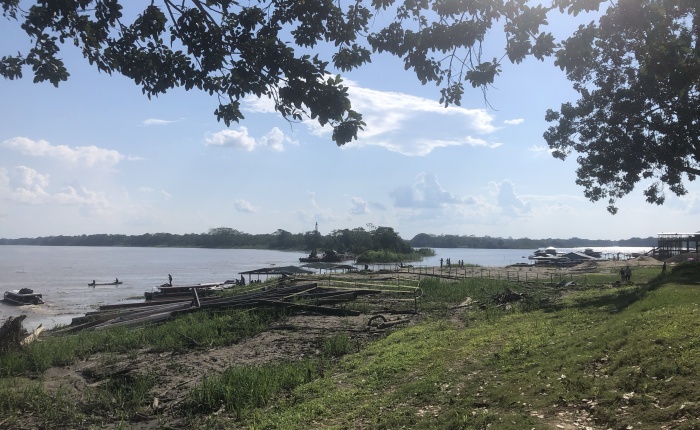Once upon a time, there was a much-visited farm. It not only housed numerous animals but was above all the home of a large family. A strange family, however, because it only consisted of one generation – there were only brothers and sisters.
One day, a young vagabond came to the farm to experience community life. So he shared the work and meals with the family. One of the brothers was responsible for gardens and stables. Therefore, every morning after breakfast he announced what work needed to be done. Once the vagabond asked him,
“Why don’t we ever let the goats out of their little enclosure so they can jump around a bit?”
“Too much effort,” the man answered, “there are more important things to do!”
And the vagabond accepted that he had a rationalistic brother.
One of the sisters constantly complained that there were no regular celebrations. Once the vagabond asked her,
“Why do you want to party all the time?”
“Because I’m bored!”
And the vagabond accepted that he had a pleasure-seeking sister.
Another brother indulged in gambling as often as he could. Once the vagabond asked him,
“Why are you so drawn to gambling?”
“Because I enjoy it! I also want to win money to make my dreams come true!”
And the vagabond accepted that he had a brother who was addicted to gambling.
Every afternoon he used to go out into nature. While hiking he suddenly heard the voice of the hill:
“Hey boy! Why the rush? You won’t find what you’re looking for that way!”
The vagabond looked confusedly to the sky and shouted,
“Who and where are you?”
“I’m not that high, I’m the hill under your feet.”
After a few doubtful looks, the vagabond said confidently:
“Oh, dear hill! I have been living on that farm with the large family. There is no shortage of work or food, activities or entertainment. But the animals need more freedom and the siblings more affection.”
“That family,” answered the hill, “resembles a cart drawn by three horses, each in a different direction; and the coachman who was supposed to drive them is dozing off. Everyone thinks they are following their heart, but in reality everyone is following one of the three horses!”
“I don’t understand, what are you trying to tell me?”
“Spend more time on that farm and you will understand my words!”
In the following weeks, three kids were born among the goats and thanks to new people, the family also grew, so that the vagabond had to share his room with three newcomers. The first was very interested in farm animals and therefore took responsibility for the stables. Once the vagabond asked her:
“What are you hoping to find here?”
“The ability to protect myself: I always get into conflicts with others and would like to overcome them. Unfortunately, though, I never manage to defend myself.”
“I can hardly believe this. It couldn’t be easier to me!” said the vagabond, but he soon got to know her better and accepted that he had a vulnerable sister.
The second newcomer he shared the room with was asked by the vagabond,
“What are you hoping to find here?”
“The ability to self-motivate. There are so many things I would like to do. Unfortunately, though, I can never bring myself to do anything.”
“I can hardly believe this. It couldn’t be easier to me!” said the vagabond, but he soon got to know him better and accepted that he had a sluggish brother.
One sister was very generous with compliments and even though she slept in another room, she liked to snuggle up to the vagabond. Once he asked her,
“What are you hoping to find here?”
“The ability to listen. There are so many people I would like to get to know. Unfortunately, though, I can never bring myself to remain silent.”
“I can’t believe that. It couldn’t b—”, but she didn’t let him finish and so he accepted that he had a chatty sister.
The last person he shared the room with was a newly fledged girl. The vagabond showed her everything on the farm, answered all her questions, and it wasn’t long before she accompanied him on his daily hikes. Once she asked him:
“Why do you always move from one place to another like a vagabond?”
“Because I’m looking for something.”
“And that would be?”
“Humility.”
Since she couldn’t do anything with it, the vagabond explained it to her whereupon she said,
“There are so many words that I would like to know. Unfortunately, though, I have a hard time understanding them.”
“I don’t comprehend everything either,” said the vagabond, and in his heart he was happy to have a little sister.
One afternoon when he was hiking with the sluggish brother, the chatty sister, and his little sister, he suddenly realized what the hill had wanted to tell him. While his companions were resting a bit he secretly left to seek the hill. When he reached it he called out,
“Dear hill! Now I understand your words!”
“Very good! However, that is no reason to leave your companions alone! Return to them and tomorrow you can come before me with complete understanding!”
When he arrived at the farm the sluggish brother said to him angrily,
“You don’t do something like that!” – and disappeared.
Then the chatty sister approached him and exclaimed,
“We were looking for you everywhere, worried about you, where were you?”
After thinking for a moment the vagabond replied,
“My craziness called me.”
“Your craziness! If you want to be alone we would understand. But then you have to say so and we’ll leave you with your craziness! Sometimes I prefer to be alone as well. Do you want to be alone now?”
“Not necessarily,” he replied with a smile. A few questions and answers later, the chatty sister left him alone.
Later, the little sister asked him with an amused expression,
“Well, did you enjoy your trip?”
He nodded, and the girl continued,
“The others were extremely worried and insisted on looking for you. But I realized that there was no need. I was sure you knew what you were doing.”
The next day the vagabond went to the hill and said,
“Dear hill! The horses that pull the cart are anger, longing, and fear. The slumbering coachman is everyone’s spirit.”
“That’s the way it is! Now you have to wake them up!”
The vagabond reacted with surprise,
“I’m sorry, what? Why me?”
“So I can tell you where you can find what you’re looking for.”
After a pause of pondering the vagabond said,
“Everything has a price, right?”
“Only from a limited perspective for there is nothing to lose and everything to gain!”
“I do not understand that. What are you trying to tell me?”
“Spend more time on the farm and you will understand my words!”
Every week, the large family met in a meeting to discuss problems, feelings and thoughts. They then all sat in a circle around a candle and each individual had the opportunity to talk freely. The speaker held a gnarled branch decorated with four different feathers in his hand. When the vagabond’s turn came he unrolled a piece of paper and described an invasion of idealists of the heart. His little speech caused a lot of amusement and afterwards everyone applauded enthusiastically. The sluggish brother and the vulnerable sister expressed their gratitude in kind words. After the meeting the vagabond hugged them both and from the following day onwards, he greeted many of the siblings with a hug every morning. This quickly earned him a reputation as a warm-hearted brother.
At the next meeting, the brother who was addicted to gambling asked visibly nervously,
“Why do we always waste so much time on emotional chatter? I’m taking part in this meeting because of the important things of living together. I don’t care one bit about all the trivialities explained! The only one who has had something interesting to say so far is our warm-hearted brother!”
The vagabond smiled and said very calmly,
“Oh, don’t say things like that.”
The faces of the others betrayed the mood of their respective owners, and the majority expressed their displeasure. Only the sluggish brother and the little sister remained silent.
“If you want to continue like this, please do! But without me!”, the gambling brother interrupted the rant and left the meeting. In response, many said they felt personally attacked and called for his immediate return. A heated discussion broke out between these people and those who wanted to break off the meeting. Suddenly the vagabond spoke,
“Now there’s no point in talking because you’re angry. Let’s resolve this matter once everyone has calmed down.”
But hardly anyone agreed to this. So the gambling brother had to come back. After all the comments from the angry people, the idea was to restore harmony by having everyone look each other in the eyes while singing a song about universal love. Some, however, stared at the ground, especially the gambling addicted brother. After the meeting, the vagabond went up to give him a hug.
The gambling addicted brother looked surprised. Hence, the vagabond added,
“The first hug between you and me …”
“Then again!” replied the other and they hugged each other a second time.
But the vagabond felt that the other’s initiative did not come from the heart.
The following morning, the gambling brother announced that he would not eat, speak, or work for three days as a way to show his remorse. But the next day he went back to eating, talking, working – and gambling. The others now treated him with more respect but the vagabond sensed that their attitude did not come from the heart. He also sadly noted that the pleasure-seeking sister was able to convince more and more siblings to go to the tavern as often as possible to get drunk.
One afternoon, he went to the hill and called out to it,
“Oh, dear hill! Until recently I thought you were right because waking the family hasn’t cost me anything and I won all their affection. But it appears that their spirits have fallen into a new slumber!”
“Go away!” demanded the hill, “You don’t understand anything!”
A time of great reflection began for the vagabond. Day by day, he spoke less and avoided the company of others.
Conflicts arose more and more frequently between the rationalistic brother and the vulnerable sister who sometimes even cried. She soon decided to leave the farm. Someone else now had to take responsibility for the stables. Since no one seemed interested, the rationalistic brother tried to convince the vagabond.
“Don’t you care so much about the goats?”, he asked him.
But the vagabond replied,
“It’s no longer worth it as I’ll be moving on shortly.”
In the end, the little sister agreed to do the job. But it was a big challenge for her, and the rationalistic brother lacked patience. One day she came to the vagabond crying. He took her in his arms and said,
“Forgive him, for he is a slave to his mind. The whole family is enchanted; all believe they are following their heart. In reality, though, they are following their desires, indignations and fears.”
“What can we do to disenchant them?”
The vagabond looked toward the hill in the distance and answered in melancholy,
“I don’t know.”
Later on his hike, he suddenly heard the chirping of a bird in a treetop.
“What a magical song!” he said, walking up to it.
But as he approached the feathered creature flew away. This made the vagabond very sad, and remembering the hill’s words, “You don’t understand anything!”, he said to the bird,
“Fly in peace, messenger of heaven! Delight with your song someone worthy of this privilege!”
As soon as he had said this the flying singer returned to the treetop to continue its song. The vagabond listened with his eyes closed and thus gained an idea of eternity.
When the melody ended he went to the farm with tears in his eyes.
At the next meeting, everyone spoke again about their problems, thoughts and feelings. When it was the vagabond’s turn he said,
“I have been very thoughtful over the past few weeks. I felt that this family was lacking something. Therefore, it seemed that I was absent half the time. And yet, I haven’t felt excluded from anything. I owe this feeling to each and everyone of you!”
Afterwards, the little sister also expressed her joy as being part of the family.
Little by little, the behavior of the others changed. One morning, everyone formed a circle to say goodbye to the vagabond. He knelt down and said,
“IN THIS MOMENT we are spiritually awake! IN THIS MOMENT we can truly be. Thank you, my brothers and sisters!”
After a while he stood up, looked at everyone’s faces. Noticing a few tears he said,
“Soon, my body will be in a different place. When my spirit will leave you, though, is up to you.”
After lots of hugs and kisses, he set off for the hill. When he reached his destination he sang a song to express his gratitude. Then, he heard the words of the hill for the last time,
“You will always find what you are looking for within yourself. Farewell, dear son of man!”
And this time, the young vagabond understood.








